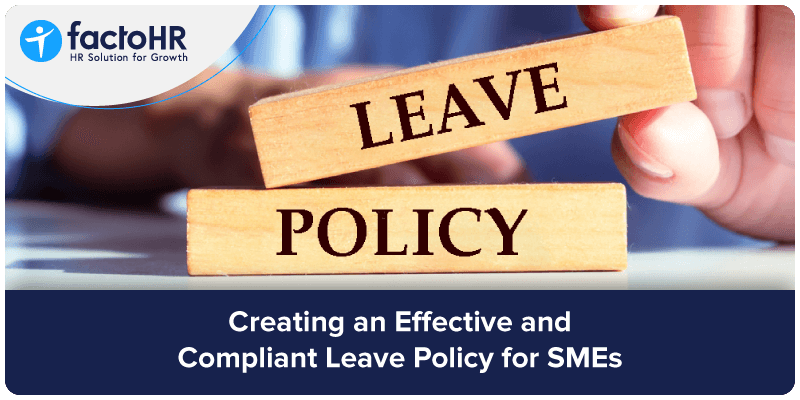How to Design Leave Policy for Your SMEs in India

Table of Contents
For an SME, having a well-written leave policy is crucial. By avoiding misconceptions, it assists in establishing a balance between the needs of the company and those of the employees. A clearly laid out leave policy is also important for compliance with local laws.
SMEs should consider a number of factors while drafting their leave policy. Some of the factors for consideration could be the size of the SME, its goals, its culture, and the needs of its employees.

Who should be Participating in Designing the Leave Policy?
The leave policy for an SME is jointly created by the management team, HR department, and CEO of the SME.
The CEO must make sure that the leave policy supports the organization’s objectives. The CEO has the last say in the matter of the policy. Leave policy will have an impact on the company’s bottom line, hence the CEOs should take into consideration the financial implications before okaying the leave policy.
The HR department must make sure the state regulations are followed by the leave policy. The department also needs to ensure that the policy is fair for all workers. The HR department is crucial in informing all employees of the specifics of the leave policy.
The management group is aware of the demands and goals of the staff. Hence it is important that a management team member participates in building the leave policy. The participating member can provide insights and feedback on the policy. The member can help to ensure that the leave policy is practical.
A leave policy design could be considered complete if the feedback of employees is involved in the design. A fair and inclusive policy can be built by following these points.
Key Factors to Consider when Designing a Leave Policy for an SME
Size of the Company
The size of the company has a great effect on the company’s leave policy. Many times small businesses cannot afford employees taking leave for a long duration as they are short-staffed. Hence, the ideal leave policy for such companies should be a flexible policy. The policy should let employees take leave as and when they need, and at the same time make sure the business is not impacted by the unavailability of the employee. A mix of paid and unpaid leaves works well for such SMEs.
Goals of the Company
Leave policy is strongly influenced by the goals of the company. A company which is focussed on growth probably would be affected if the employees take leave often. Hence, it won’t be able to offer more leaves. For such SMEs, the policy could ask the employees to give advance notice before taking a longer duration of leave. The SME would also be offering only a limited number of leaves. The company could also incentivise employees who take fewer leaves.
Company Culture
Leave policy is often influenced by company culture too. A company which promotes a culture of work-life balance would like to offer more leaves to the employees than those companies which prioritise work.
Post-pandemic, businesses are more aware of the importance of work-life balance. Many businesses which give higher value to work-life balance might offer more leaves like vacation days and personal off days. Such companies will also help employees who are dealing with personal or family issues. Hybrid or remote work options are also available with such companies.
Employee Needs
An ideal leave policy should consider the specific needs of employees. A company which tries to make a ‘one shoe fits all’ leave policy is bound to make a lot of employees unhappy. A policy which takes care of the different needs of employees and is flexible is the most desirable one by employees. Many compassionate businesses also provide support for employees who are dealing with personal or family issues, such as counselling or time off for medical appointments.
Local Laws
The local laws have a great impact on the leave policy of any SME. In India, there are multiple acts which govern the laws regarding leave:
- The Factories Act, of 1948,
- The Plantations Labour Act, of 1951
- The Maternity Benefit Act, of 1961
- The Payment of Gratuity Act, of 1972.
All companies which operate in India must abide by these laws and follow the minimum leaves guidance set in those laws. Otherwise, SMEs risk penalties.
Apart from these compulsory leaves, SMEs in India should design leave policies which offer other types of leaves like vacation time, personal time off, and sick leave. There are circumstances when the employee needs to take care of family or spend time on social causes. Companies should look to accommodate such leaves thereby improving employee morale.
SMEs should always keep themselves abreast of changing local laws and regulations. Non-compliance with the laws can impact the business. The Human Resources department of the SME should be responsible for keeping track of the statutory laws and company policies.
To learn more about the process of leave policy design read our Leave Management Guide.

How should the Leave Policy be Handled?
Companies should keep the leave policy always updated in line with any changes in the laws, business needs and employee needs. Communication is key, and it is important to ensure that employees understand the leave policy and how to apply for leave. The guidelines, processes and procedures associated with the leave policy should be in place. Companies should ensure all employees are aware of these by communicating them during induction for new hires. There should also be refresher sessions periodically for all employees.
To execute this effectively, choosing the best leave management system for Indian companies should be a priority. A robust leave management system enables the effortless management of employee leaves and helps SMEs orchestrate their policies in compliance with local regulations like the Maternity Benefit Act and the Payment of Gratuity Act.
How does having a Well-designed Leave Policy Help SMEs?
Having a clear leave policy for an SME is important for several reasons:
Compliance with the Governing Laws
A well-designed leave policy should take into consideration, as a minimum, all the applicable laws governing employee leaves. Since non-adherence to the laws results in the company being penalised, a clearly designed leave policy helps to avoid such scenarios.
Employee Satisfaction
Employee satisfaction results in a higher quality of output from them. Creating a great work-life balance for employees increases their satisfaction levels. A well-thought-out leave policy helps in ensuring employee work-life balance. When employees can plan their vacations and take the time to care for their personal requirements and well-being, they feel rejuvenated.
Productivity
A leave policy also ensures that the organisation can continue to function successfully even while employees are on leave. This can help to boost productivity and keep corporate operations running smoothly.
Fairness
A leave policy that has been designed with focus on employees’ well-being, helps to ensure that leave entitlements are fair and equitable for all employees. It helps to prevent discrimination or favouritism and promotes a positive work culture.
Communication
A clearly-defined leave policy ensures that employees understand the rules and procedures for seeking and taking leave, as well as any constraints or restrictions that may apply. This can help to avoid confusion or misconceptions and ensure that the leave policy is correctly implemented.
Flexibility
Both employees and the employer should have the flexibility to protect their interests while availing and sanctioning leave. This means while the employees have flexibility in opting for various forms of leave, the employer should have the flexibility to schedule work in such a way that there is no negative impact on business due to employees going on leave. A well-designed leave policy allows for such flexibility.

Conclusion
A leave policy for an SME should be designed to help employees. This means that the leave policy should be fair, flexible, and easy to understand.
Grow your business with factoHR today
Focus on the significant decision-making tasks, transfer all your common repetitive HR tasks to factoHR and see the things falling into their place.

© 2026 Copyright factoHR


